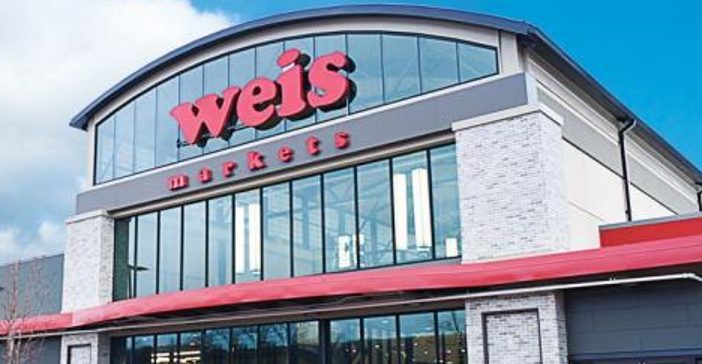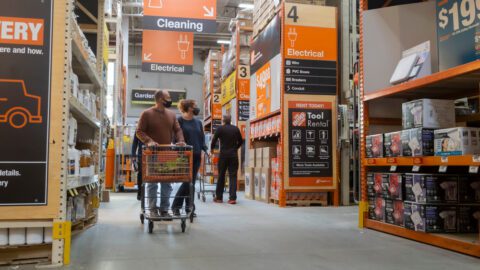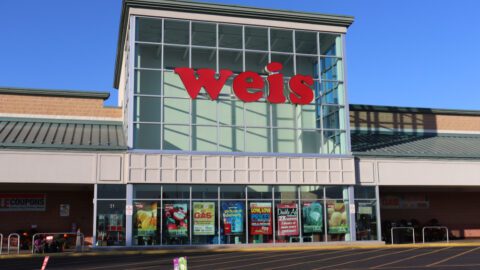As a grocer with more than 23,000 associates across more than 205 stores, and 1,000 employees in distribution centers (DCs) and headquarters, Weis Markets sought to provide a better in-store mobile experience for employees and shoppers with an improved wireless infrastructure.
With the Aruba network in place, Weis has:
- Eliminated Internet access “gaps” throughout its stores;
- Reduced wireless deployment costs;
- Improved operational efficiencies within the DCs through more accurate product picking; and
- Centralized management capabilities, including software updates and alerts.
Wireless Access Points Fill In-Store Connectivity Gaps
Overall, the network connects 11.5 million square feet of retail store, warehouse and distribution center space. The Aruba infrastructure is designed to spread wireless coverage across each individual store and eliminate notable gaps in Internet access depending on specific areas of the store.
“The future vision was to implement a solution that was redundant,” said Jacob Koch, Manager of Systems Administration for Weis Markets in an interview with Retail TouchPoints. “The Aruba solution allowed us to put enough access points in so that if I lost half, the wireless in the store would continue to operate. As we continue down this path in technology, retail in general is becoming more dependent on wireless infrastructure and IoT, and I don’t think that’s going to change. Actually, I think it’s going to become more dependent on it. The driver behind that is the ability for the associates and the managers out on the floor selling the product versus being behind a desk.”
Weis replaced its Cisco wireless access points (APs) in 2014 and standardized on the Aruba WiFi service companywide, opting to select Aruba’s Gigabit WiFi Instant APs. Koch noted that the wireless upgrades are designed to cater to mobilized employees “not just from an application standpoint within an iPad, but also the ability to use a VoIP phone system that could be integrated within an iPad. It’s bringing that desktop experience to the mobile platform.”
Wireless Access Reduces Costs, Bolsters Picking Accuracy
With approximately 5,000 APs deployed mode — across the company’s 205 stores, distribution and warehouse centers, as well as a store support center in Sunbury, Penn. — Weis eliminated the need to deploy a wireless controller in every location. A controllerless model enables the grocer to quickly bring new stores online at a much lower cost, the company reported.
Within its DCs, Weis uses a combination of wireless headsets and Honeywell’s Vocollect over the Aruba network to enable a voice-controlled product pick system designed to help associates select products quickly and easily. The increased picking accuracy resulted in a higher percentage of correct product on store shelves, improving the overall efficiency of Weis Markets’ inventory processes.
“It was very important to ensure that the picking devices worked,” said Koch. “But we had to move away from the traditional headsets and make sure that the VoIP could be understood clear as day. We can’t afford to have a miscommunication on product orders — this is a 24/7 operation so downtime is few and far between.”
Network Management Centralizes Updates, Alerts Through One Platform
Combined with Aruba AirWave network management, the Weis Markets network administration team can make configuration changes and update software across all of their stores’ Instant APs quickly and easily. The platform’s alerting capability allows the team to identify any AP issues, rogue devices (devices that are unauthorized to connect to a wireless network) or network problems so they can be quickly resolved.
“When we initially converted our stores, we were able to provide improved connectivity so that when employees were ordering on the floor, the Internet wasn’t disconnecting in the middle of their orders,” Koch said.
In-Store Analytics, Push Notifications Next On The Agenda
Weis Markets is preparing for various future IT initiatives. Koch noted that once the grocer fully upgrades its AP system, the company plan to adopt analytics software to monitor customer shopping habits so they can better respond to customer needs. In addition, Weis will evaluate the use of push notifications to send relevant coupons and offers to customers who opt in to the network.
Other future initiatives might include digital product pricing on shelves, asset tracking for grocery carts, and even robots for in-store clean-ups, but no timetable has been set for the projects.











